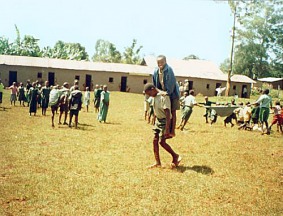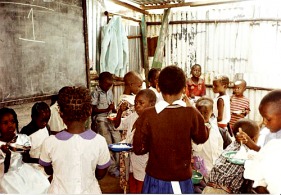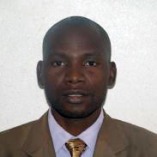Something exciting happened last week. For the first time, Community Breakthrough Support mission had large public radio coverage. The moderator, Joseph Wanjala, of WESTI FM 99.8 spoke for over 15 minutes about CBSM. Even though we heard the programme and rejoice in the event, we can hardly believe it happened.
It all started on Kenyatta Day, Oct. 20. This is a day that is meant to honour the first president of Kenya, Mr. Kenyatta, in official style, when people gather together and participate in all sorts of public entertainment. On this day, our school children performed a song and a poem for the attending crowd.
A journalist approached us, wanting to know more about the children. Out of this conversation, came Joseph Wanjala’s request to air our activities. Of course, we readily accepted.
The day arrived. Unfortunately, the programme did not go on as scheduled, but was delayed for about 30 minutes. The committee members, who had been waiting to hear the programme since the morning, managed to reach me as I was out doing various tasks for the mission.
I rushed to a home nearby with a radio and listened to last half of the programme. This was the part where they were talking about our dilemma to find sufficient resources for the children. They went on and discussed both the short term and long term benefits of our project in the community. It was wonderful to hear people speak so positively about our work.
They finished by giving the two names of people behind the project: mine for local inquiry and Lia Hadley in Germany for other inquires. They also talked about “Our Song Circle - Wimbo Mviringo” site. They mentioned our wish for active participation from other schools.
The committee members, who had managed to listen to the whole programme, said it started with a recording of the performance of our children on Kenyatta Day. All in all, the programme managed to extensively cover our work and our vision for improving the health and education of our children. What a gift this is for our CBSM family.
There have been many inquiries since the programme was aired. Schools have been calling to find out more about “Our Song Circle - Wimbo Mviringo” site. This is very good and we will do our best to react promptly, so as to benefit from their interest. Many people, even some of our neighbours, have come over to offer their help. They didn’t realise what it is that we are doing. They were misguided and thought we were some up-and-coming private school. Thankfully, this radio program dispelled these notions.
Sadly, the programme has also triggered an inflow of potential applicants for needy children to be helped. Presently, we are struggling to feed and educate the 250 OVCs in our care. We just do not have capacity to admit any more at this time. The fact that so many people are coming to us asking for application admission forms challenges us. I have to talk to the elders’ council about these matters and see what can be done.
All in all, we are very thankful for Joseph Wanjala’s interest in BBSM and feel that such media exposure is a wonderful thing indeed.
We are proud to announce that we have set up a website for school classes from around the world to share with others their creativity and connection. The site is called Our Song Circle - Wimbo Mviringo. We feel very privileged to participate with you in this exchange of peace and fellowship.
Please spend some time looking through the school projects presented here. Our children would be delighted if you would consider joining Our Song Circle and making projects of your own. School classes of every age group are welcome.
Like many optimistic parents, I live with day-to-day worries and challenges trying to understand our family life and how it plays a part in my vision for a better future. For, in my vision poverty plays less of a role that it does now and certainly has in the past.
I am biological father of two boys and two girls. Yet, my own children do not differ in any way from the children of the Community Breakthrough Support Mission. I am a father to them all. I offer the same prayers to all of them. I believe that a child is a child, and that is why my children are being raised together with CBSM children: they go to the same school, share the same meals, carry out the same chores, play the games, etc.
If wishes were horses, then I wish that any person who comes in contact with me does not remain the same. I pray for better future for my children, and among the prayers is the hope they will be educated to university levels, they will marry and give birth to sons and daughters, have successful families, and they may continue fearing God in their lives.
Even though at times we may not have any resources to provide, and many people might consider us poor, this is not so. For, by nature, we don’t lack at all. We can’t be poor in everything, for God is gracious. Hence, I concentrate on offering prayers to those who are in contact with me. I feel it is a resource near to me.
In my own family, I’d like to see that the life of my children will be different from life we lived with our parents. This is done by identifying areas of weakness our family suffered and correcting these same difficulties in my family. One area that we are trying to address is how to utilise opportunity, especially the opportunity to attend school.
Education is the foundational light for the children. It’s the key to their future. My duty is to ensure that such notion is becomes known throughout our community. It is important that all children, whether girls or boys, utilise the opportunity of being in school. It is a first class tool to fight poverty. This teaching can influence poverty by eliminating illiteracy, enlightening children to prepare for their future.
 Recently, someone asked me what our children do with their days; what do they do at home or in school; what type of activities do they participate in. I thought I would write about these things.
Our children live either in our CBSM home/school facilities and are fully under our care, or, they live in alternative homes. We try to find alternative homes as much as possible for our children; family life is important for young children. Yet, in some cases the children are subjected to conditions that are not good. We can tell that is the case by changes in their behaviour, and then we move the child back into our home/school compound.
Normal Day Schedule
Wake up around 6 am
Activities
1. Pray
2. Bath
3. Eat breakfast
4. Go to school by 7:40 am
Meals
1. Eat breakfast in the morning
2. Porridge/tea at 10 am (when available)
3. Lunch at 1 pm
4. Tea/porridge at 4 pm (when available)
5. Supper/dinner between 6:30 pm and 7:30 pm
Journey to School
The children who do not live at the CBSM children’s home, and this is the majority of our children, walk various distances to school each day. Some are fortunate and live very close to the school. Some live very far away, approximately five to ten kilometres away.
 Recently, someone asked me what our children do with their days; what do they do at home or in school; what type of activities do they participate in. I thought I would write about these things.
Our children live either in our CBSM home/school facilities and are fully under our care, or, they live in alternative homes. We try to find alternative homes as much as possible for our children; family life is important for young children. Yet, in some cases the children are subjected to conditions that are not good. We can tell that is the case by changes in their behaviour, and then we move the child back into our home/school compound.
Normal Day Schedule
Wake up around 6 am
Activities
1. Pray
2. Bath
3. Eat breakfast
4. Go to school by 7:40 am
Meals
1. Eat breakfast in the morning
2. Porridge/tea at 10 am (when available)
3. Lunch at 1 pm
4. Tea/porridge at 4 pm (when available)
5. Supper/dinner between 6:30 pm and 7:30 pm
Journey to School
The children who do not live at the CBSM children’s home, and this is the majority of our children, walk various distances to school each day. Some are fortunate and live very close to the school. Some live very far away, approximately five to ten kilometres away.
Quite often we are asked how children find their way to the Benando Breakthrough Support Mission. There is no typical way. The family and living circumstances of the children vary, but they generally belong to one or more of these categories:
* Children on the street
* Orphans
* Children of imprisoned parents
* Neglected
* Abandoned/abused/heart broken children
* Rescued child labourers
* Child mothers
* Rescued commercial sex workers
* Children of widows or single mothers that cannot care for them
The children are most often brought to use by good Samaritans, neighbours, police, and social services officers. Even though there is no typical way that describes how children find their way toCBSM, there are usual ways. In a later blog post, I will write how formal and informal processes are practised.
For now though, I thought I’d share with you the story of Wanjala*, who came to us last February. Wanjala came to our project on his own. He had fresh wounds on his leg as a result of political skirmishes in Mt Elgon, but fortunately he managed to flee further dangers.
Many of the people were running towards Kimilili to flee the violence, and so, he managed to accompany them. It was a long way to Kimilili, but the people had no choice in where to go because the other side of Mt Elgon has extensive forested areas with wild animals, cliffs and rocks: after which is Uganda.
Wanjala knew nobody when he arrived in Kimilili. A good Samaritan took him to the council of elders in this area. The council of elders gave Wanjala a letter of introduction to our project. Even though he was assured we would take care of him, he was scared.
He was in a lot of pain from his leg injury, unsettled in spirit because of the violence he’d recently escaped, and hungry after the long journey. We took the initiative of taking him to the government hospital, where his wound was dressed. We were also fortunate in being able to identify, at a later point in time, a distant relative of his. We went and talked to him and he accepted Wanjala into his family’s home.
It is now eight months later. Wanjala lives near the CBSM facilities and attends our school. His leg injury has healed and he has settled into life at CBSM. Wanjala is doing well in school; he is studying without problems. He plays football, participates in our drama group, and enjoys singing in our choir. Because of his age, we have also given him responsibilities of a school prefect. He has made friends amongst his schoolmates. More importantly, he is now a member of our BBSM family.
* Name has been changed. Wanjala is common name in this region. It means famine and it is given only to children born during famine/hunger season.
|







 RSS Feed
RSS Feed